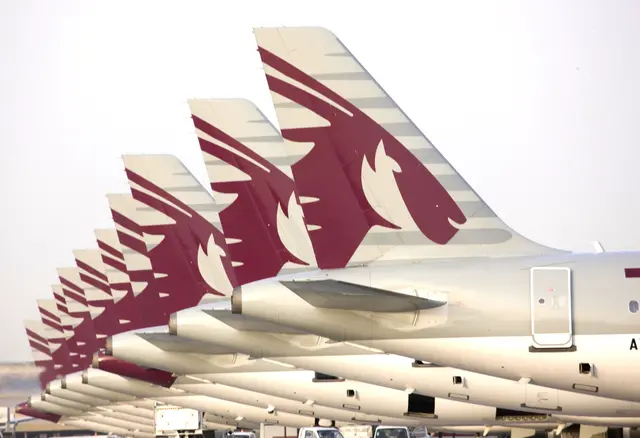Several countries have cut ties with the tiny Gulf state over accusations of supporting extremism in the region.
Air, land and sea links have been halted to the country from Saudi Arabia, the UAE, Egypt and Bahrain.
Qatar denies backing militants, including so-called Islamic State (IS), and said the move was "unjustified".
The unprecedented move is seen as a major split between powerful Gulf countries, who are also close US allies. It comes amid heightened tensions between Gulf countries and their near-neighbour, Iran.
Who has done what?
Bahrain, Saudi Arabia and the UAE co-ordinated together to set the diplomatic withdrawal into motion, closing all transport ties to Qatar, a tiny gas-rich peninsula.
They have given all Qatari visitors and residents two weeks to leave their territory. The three countries have also banned their citizens from travelling to Qatar.
The UAE and Egypt have given Qatari diplomats 48 hours to leave both countries.
audi Arabia took it one step further by closing down a local office of Qatar's influential Al Jazeera TV channel.
However, the country says it will still allow Qataris to take part in the annual Hajj pilgrimage to Mecca.
Egypt, Yemen, Libya's eastern-based government and the Maldives later followed suit in severing diplomatic ties.
The diplomatic crisis is likely to disrupt Qatar's food imports from Saudi Arabia
What about air disruption?
Saudi Arabia's civil aviation authorities have banned Qatari planes from landing or stopping at its airports, as well as crossing Saudi airspace.
Egypt has also closed off its airspace to flights originating from Qatar, and said all flights between the two countries would be halted from 04:00 GMT on Tuesday and "continue until further notice".
Airlines from many of the affected countries, including Bahrain's Gulf Air, Etihad Airways and Emirates, say they plan to cancel flights to and from the Qatari capital Doha starting from Tuesday morning.
Budget carriers, such as Fly Dubai and Air Arabia, have also cancelled routes to Doha.
The national airline, Qatar Airways, meanwhile has suspended its flights to Saudi Arabia.
The BBC's Simon Atkinson says the suspension of flights may cause a major problem for the airline, forcing it to alter flight paths and inevitably add time to some flights.
There are reports of residents stockpiling food and water, as Qatar is heavily dependent on Saudi Arabia for its food imports.
About 40% of Qatar's food is believed to come by lorry from its Gulf neighbour.
An official with Iran's Union of Exporters of Agricultural Products was quoted by Fars news agency as saying Tehran could export food to Qatar by sea within 12 hours.
Why has this happened?
While the severing of ties was sudden, it has not come out of the blue, as tensions have been building for years, and particularly in recent weeks.
Two weeks ago, Egypt, Saudi Arabia, Bahrain and the UAE blocked Qatari news sites, including Al Jazeera. Comments purportedly by Qatari Emir Sheikh Tamim bin Hamad al-Thani criticising Saudi Arabia had appeared on Qatari state media.
The diplomatic crisis is likely to disrupt Qatar's food imports from Saudi Arabia
The government in Doha dismissed the comments as fake, attributing the report to a "shameful cybercrime".
Back in 2014, Saudi Arabia, Bahrain and the UAE withdrew their ambassadors from Qatar for several months in protest over alleged interference in their affairs.
More broadly, two key factors drove Monday's decision: Qatar's ties to Islamist groups, and the role of Iran, Saudi Arabia's regional rival.
While Qatar has joined the US coalition against IS, the Qatari government has repeatedly denied accusations from Iraq's Shia leaders that it provided financial support to IS.
Wealthy individuals in the country are believed to have made donations and the government has given money and weapons to hard line Islamist groups in Syria. Qatar is also accused of having links to a group formerly known as the Nusra Front, an al-Qaeda affiliate.
The SPA statement accused Qatar of backing these groups, as well as the Islamist Muslim Brotherhood - banned in Gulf countries as a terrorist organisation - and that it "promotes the message and schemes of these groups through their media constantly".
Saudi Arabia itself is a key backer of Islamist rebels, including hard line jihadist groups, in Syria, and has even been accused of funding IS.
While on a visit to Riyadh two weeks ago, US President Donald Trump urged Muslim countries to take the lead in combating radicalisation, and blamed Iran for instability in the Middle East.
Experts say this may have emboldened Gulf states to take action, knowing that they had the backing of the Trump administration.
What has been the reaction?
Qatar, which is due to host the football World Cup in 2022, was critical of the decision. The foreign ministry said the decisions would "not affect the normal lives of citizens and residents".
Iran, Turkey and the US have called on all sides to resolve their differences, with US Secretary of State, Rex Tillerson, pressing for dialogue.
The White House said President Trump was committed to de-escalating tensions in the region. Qatar's stock market closed down 7.27%.
In a country of about 2.5m, nearly 90% of Qatar's population are migrant workers - many of whom are working on the construction boom fuelled by the successful World Cup bid.
(BBC)
 简体中文
简体中文

